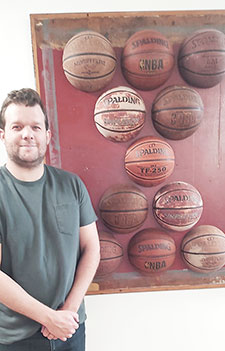 *
*
At a recent Open Studio Event in Somerville, I came across an interesting artist, Daniel Coughlin. What struck me at first was his work with old basketballs. Coughlin is much more than a basketball artist, and works with many different objects in his practice.
Doug Holder: How has Somerville been for you as an artist? What has your experience been like at the Joy Street Studios?
Daniel Coughlin: Moving to Somerville represented a significant step forward on my path as an artist. Prior to finding a space at Joy Street I was living in Western Massachusetts where I kept a small home studio. It was isolating on many levels. After a short residency in Berlin (Germany) where I was exposed to a thriving creative community, I realized interaction with other artists was vital to the artistic process. Since then, my work has greatly benefited from access to the larger Somerville arts community, epitomized by my neighbors here at Joy Street. It’s all support. At a time of rapid development in Somerville and the greater Boston area, I hope these communities and art spaces can continue to thrive.
DH: You studied with Cambridge sculptor, Peter DeCamp Haines, and he introduced you to the lost wax bronze casting process. Can you tell us about the process, and how has it manifested itself in your work?
DC: Peter provided my first introduction to a professional art practice. He shared his creative process and taught me the importance of developing your own voice as an artist. He has worked with bronze for decades and during that time created a language that allows viewers to immediately recognize and connect with his art. The lost wax process specifically, allows an artist a high level of control and accuracy in re-creating a wax form in bronze. I have created a number of small bronze works that were an extension of what I learned while working at Peter’s studio in Cambridge. I look forward to creating a series of new bronze pieces sometime in the future.
DH: I am particularly interested in your work with basketballs.
DC: The basketball series represents the search for my own artistic process. I’ve spent years finding, collecting and organizing a library of diverse items that reflect my day-to-day built environment. Using recognizable materials to fabricate structural forms gives viewers immediate access to my process. Additionally, each basketball’s unique patina – the weathering of the leather surface – conjures the time, place and histories of these objects. The moment where form and the context of each object or material meet, is the layer where I hope to create and exist as an artist moving forward.
DH: Does your job as an architect inform your work as a sculptor?
DC: Yes, absolutely. My understanding of form, scale and material, and the constraints of factors such as site and space, is a direct result of my architectural training. These elements show up in most of my work.
DH: Why should we view your work?
DC: My work explores the built environment we encounter each day. A new life for a found object, a new use for everyday materials, makes us reconsider our experience in the built world. I hope my work gives viewers a new way to interpret their everyday realities.















Reader Comments